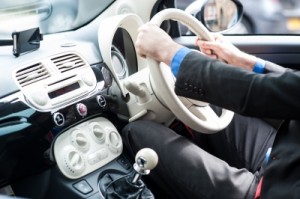An “attention-powered” car that monitors brain activity and slows acceleration when it detects periods of distraction has been unveiled on Wednesday by Australian road safety researchers.

AFP reports that the car, which was commissioned by the Royal Automobile Club (RAC) of Western Australia, is about to depart for an awareness-raising road trip in Western Australia.
The ‘attention-powered’ car measures the type and amount of brain activity using the ‘Epoc’ headset which has 14 sensors. The headset has the capacity to override the car’s accelerators when it detects that the driver is distracted.
Lead researcher Geoffrey Mackellar, from Australian neuroengineering company Emotiv, shared that during the testing phase, drivers were asked to go on a 15-kilometre per hour ‘boredom lap’ to see what happened when their brains “zoned out”.
Specific challenges were also given to drivers such as using the mobile phone, switching channels on the radio, drinking water, and reading a map.
“We’re looking at things like blink rate, blink duration, gaze rate — how long they look at a point — eyes moving, head tilts, and also frequency of task-switching and the level of brain activity when they flick over to those tasks, so it’s a huge pool of data,” said Emad Tahtouh, from production company FINCH.
“If someone lost attention and they switched tasks to, say, reading their mobile phone, or even if they just zoned out, it would usually be represented by a very sharp dip and sometimes very erratic behaviour.”
Even more complex is measuring ‘task switching’, which goes beyond the physical traits observed when a person is distracted. Psychology PhD student Lisa Jeffries explains in a related article on Wired.co.uk:
“The fact is that you cannot do more than one thing at a time usually, you are in fact switching from one to the other,” said Ms. Jefferies, who is also working with RAC. “And every time you switch, there’s a cost.”
Mr. Mackellar said the brain is basically an ‘attention-machine’.
“The front part of the brain has to be active and very much involved in driving because the subconscious brain doesn’t know that driving out of a lane is going to cause a problem.”
The pilot vehicle is a customised Hyundai i40 and was built for a research and publicity campaign which aims to reduce the number of road casualties in the State. Road deaths in Western Australia currently run above the national average and are the worst in Australia, according to the report.
“The impact of inattention is now comparable to the number of deaths and serious injuries caused by speed and drink driving,” said RAC chief Pat Walker.
“Nationally, it is estimated inattention was a factor in 46 percent of fatal crashes.”
Data from the RAC revealed that 20 percent of Australian drivers involved in crashes admit they were staring directly at the object they ended up hitting. However because they were distracted, they did not comprehend what was happening at the time.
The Australian government estimates that road accidents cost the economy about A$27 billion every year.




















